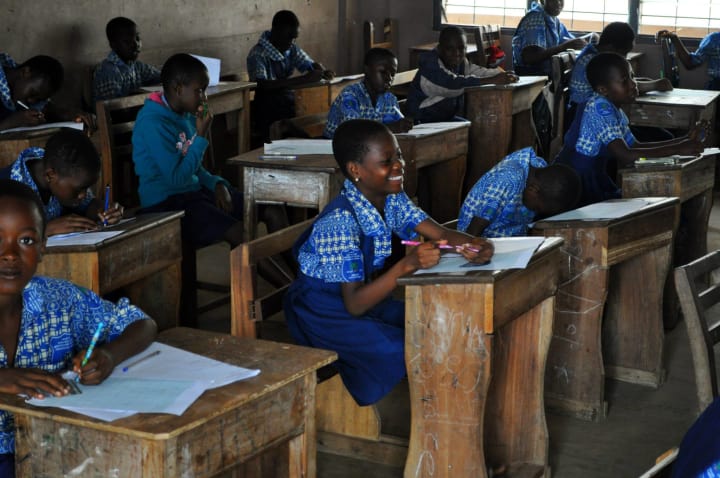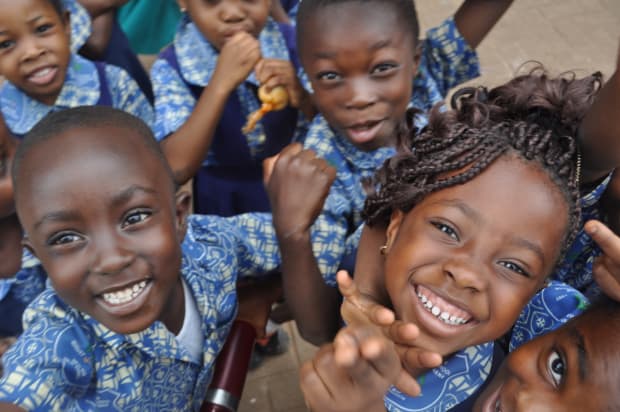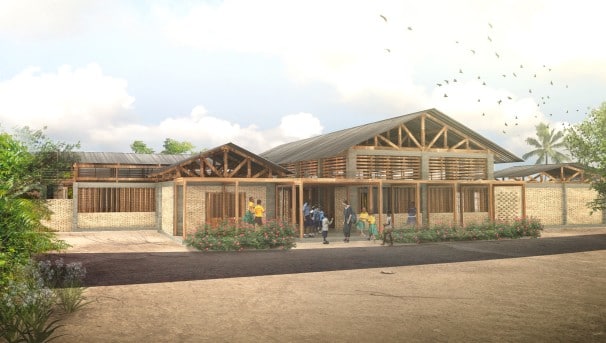This project is now in update mode. Check back regularly to see how things are progressing.
Sustainable Education in Ghana
Sustainable Education Ghana (SEG) is an interdisciplinary design team under Cornell University Sustainable Design (CUSD) consisting of 23 undergraduate and graduate students from 5 different colleges across the university. SEG has partnered with Voices of African Mothers (VAM), a non-profit based out of both Accra and New York City that currently runs John Williams Montessori School in Kumasi, to design a girls academy in the rural communities surrounding Sogakope in the Volta Region of Ghana. Since 2015, students on SEG have been working through initial development, research, and design which has culminated in a design for VAM Girls Academy that has been created with the intention of being a place where girls are encouraged, supported, and safe in their pursuit of an excellent education.
Our mission is to provide a population of girls with a nurturing setting for academic and vocational training with ecological stewardship at its focal point. The students who will be attending this school are generally part of poor communities who do not have access to an educational environment that inspires them to work hard toward ambitious goals. Together, we are working to ensure that VAM Girls Academy is designed by putting the true needs of the students first and is prepared to serve girls from Ghana and beyond for many years to come. SEG traveled to Ghana in July 2015 and January 2017 with VAM to learn about their existing programs, hear stories from Ghanaian students and education professionals, and work closely with our local partners to get feedback on our design.

Education in Ghana
UNICEF reports suggest that just over 43% of Secondary school aged Ghanaian females were enrolled in school. This figure drops to under 34% in the rural areas of the country. A host of factors – including cultural beliefs, limited resources and poor access to education – have played their part in producing this outcome. VAM Girls Academy intends to challenge the status quo and enable girls with limited resources attain an education that fosters creative expression and awareness towards the community and the environment in addition to personal, intellectual and vocational growth.
Through the implementation of free and flexible spaces in the library and courtyard, the school endeavours to promote dynamic and open-minded thinking. The open spaces in the courtyard present recreational opportunities for students to freely express themselves. The library hopes to provide students with spaces that grant mental and physical relief along with unconstrained access to art and literature from around the world. The aim is to foster fearless expression of individuality among the generation of students attending VAM Girls Academy.
The design of the buildings places strong emphasis on minimizing the school’s carbon footprint. Therefore, the building is orientated in a manner that fosters passive cooling and ventilation, eliminating the requirement of an electrical HVAC system. Additionally, all of the rainwater on the buildings can be collected, treated and reused in the system. Solar energy will provide the primary source of power for the whole school once it is fully operational. These aspects help promote the idea of sustainable living through the accomplishment of rich, aesthetic appeal with minimal damage to the environment. In turn, this design hopes to heighten awareness towards sustainable resources with the goal of promoting a green way of living in the area.
Finally, VAM Girls Academy is taking the initiative to contribute to the community of Sogakope. Belonging to an area rich in agriculture, the school will delegate approximately half of its 200 acres to farming to contribute to the local economy. This will also supply fresh produce for the school, enabling the implementation of a closed-loop system and allowing the students to learn local trade. In addition, the materials for the structure such as the bricks, the roof etc. have been sourced locally to create a self-sustaining community.
How will your support be used?
SEG is now helping Voices of African Mothers implement the school we have designed. This summer, we are planning to return to Sogakope and help complete pre-construction preparations, including working with a local contractor and architect to ensure mutual understanding as we bring VAM Girls Academy to life.

About the Design
The design of this school fulfills Cornell University Sustainable Design's (CUSD) mission of advancing economic, social, and environmental sustainability.
- The focus on agriculture will teach students about economic and environmental sustainability through the development of local farmland for educational uses.
- The schoolhouse and wider campus will engage the people of Sogakope by hosting events and markets, creating a symbiosis between the school and local community.
- This project will promote cultural understanding through the facilitation of open discussions in multifunctional classroom settings.
Ultimately, the Sogakope schoolhouse will be an emblem of educational opportunity, human-centered design, and sustainability for the eastern Ghanaian region. Our sustainable building model will be scalable and able to be replicated by other industries in the region. In this way, the project will create an impact that reverberates exponentially beyond the Sogakope schoolhouse.

About Voices of African Mothers
Voices of African Mothers (VAM) is a 501(c)3 organization with Consultative Status to the ECOSOC (Economic and Social Council) branch of the United Nations that pursues projects that seek to ameliorate problems identified in the the United Nations Millennium Development Goals such as education, gender equality, and poverty. VAM was founded by Nana Fosu-Randall in 2004 based on the belief that women’s education and empowerment is essential to the development of a peaceful African continent. Nana was born in Kumasi, Ghana, and worked for the United Nations for 30 years, where she served as the Chief Financial Officer. She also served on the Keeping the Peace Missions that were responsible for rebuilding areas of the Middle East that were devastated by the Gulf War. After witnessing the destructive impacts of war, specifically on women, in Liberia, Nana was inspired to establish Voices of African Mothers. VAM currently oversees the John Williams Montessori School in Kumasi, Ghana and has plans to create a Montessori high school nearby.
$20
Support a Student
Your donation will cover one day of food, lodging, and transportation for a student to stay on-site in Sogakope, Ghana. This is one more day that SEG students are able to engage with the community that will be attending VAM Girls Academy, and one day closer to bringing this school to life!
$40
Transportation to Sogakope
Your donation will cover the transporation costs for the entire student team to travel from Accra to our site in Sogakope.
$60
Visa
Your donation will cover one visa for a member of our team to travel to Ghana and work with VAM to prepare the site for construction.
$100
Vaccinations
Your donation will cover vaccinations for one member of SEG to be able to travel to Sogakope.
$500
Accomodations
Your donation will cover all accommodations for students on-site in Sogakope. It is important to us that we are living in the community we are working with to strengthen the relationships we have made with community members.
$1,000
Sponsor a Student
Your donation will cover all travel costs for one SEG student to travel to Ghana and work with the Sogakope community to prepare the site for construction and strengthen ties with families who will have daughters attending VAM Girls Academy. It has been critical for SEG students to be actively engaged in the Sogakope community, and your generosity will allow one of our student engineers, designers, and architects to be part of the implementation of VAM Girls Academy.


